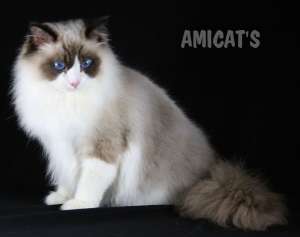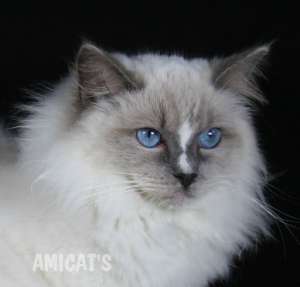RAGDOLL
Facebook https://www.facebook.com/petclube/.
Moderno Gatil Amicats Original São Paulo SP
AMICATS® Gatos-Gigantes Maine coon Bengal Ragdoll Exotic & Mini Gato Toycat -(novidade)
Criação Gatos com Certificação IPC Ecologicamente Correta
F: 11 98485 4545 whatsapp hc F : 11 96393-1128 Dr Gabriel
Contato: petclube.info@gmail.com / amichettibully@gmail.com
Amicat Petclube Group can offer you best ragdoll kittens of different colors!
Petclube Amicats Ragdolls is a home cattery, located in Juquitiba Sp Br, We breed and raise our Ragdolls in our home as part of our family, underfoot, giving them lots of love and personal attention. The Ragdoll is a very social and loving cat. They often follow us around the house, to oversee our work at the computer or other assorted household tasks. Our cats/kittens are never caged, but given "hands on" love and attention from birth until you take your kitten home.
Since our cats have such a wonderful temperament, they are able to travel the country and be in the show halls, without the use of any drugs. We are extremely proud of the exceptional laid back quality of our breeding stock, and know that you will be too! We breed for excellence in HEALTH, TYPE, and TEMPERAMENT.
Amicats-Petclube provides the cats and kittens lots of room to run and play with each other and their toys. Our cats and their kittens have free roam of the house, which provides them alot of attention, cuddling, and love. That also helps them get accustomed to all the sounds and noises of the home, so that they will better adapt to your home. They also enjoy a secured area outdoors, to enjoy the sun and play with the butterflies! Our Bulldogs, provide the cats with an extra “buddy” to interact and play with. Ragdolls are wonderful companions to any size of dog. They will join your family and will make your dogs their friend for life!
Our goal is to produce healthy well socialized kittens with the wonderful Ragdoll personality. Our kittens come from USA and 
Canada Champion lines. In addition. We provide the highest quality veterinary care available.
Because we are a small home cattery, we only have a small number of litters of kittens in the traditional and non-traditional colors per year. Unlike many catteries that you will see listed on the winners pages, we do not breed large numbers of kittens. All breedering cats are listed on our Kings and Queens page. If you are interested in obtaining a kitten, please contact us by phone or emailregarding kitten availability. Information on the Available Kitten page is updated weekly, so it is your best source on what kittens are currently available.
eet the breed that’s captivating the hearts of cat owners around the world – the Ragdoll cat. The breed’s special traits include a sweet temperament, beautiful coat, generous size and big blue eyes. So exceptionally friendly that it will follow its human companions from room to room, the Ragdoll has become the fastest growing and most loveable breed of cat ever developed.
The Ragdoll cat is a semi-long haired colorpoint cat of considerable size. They have a sweet nature, non-aggressive, docile disposition. Full color development is not achieved until the Ragdoll reaches around two years of age and full weight and size is not achieved until the cat is fully mature at around three years of age. One of the truly unique characteristics of the Ragdoll is their ability to “go limp” when being held (and therefore relaxed) – this explains the naming of the breed.
Ragdolls are wonderful family cats, blending easily into the family environment and seem to have a natural rapport with children and other furry family members. They love to play and it is essential, as they are strictly indoor cats, that you provide them with plenty of stimulating toys including a scratching post or play gym to encourage play and exercise.
In the 1960s Ann Baker started with a regular non-pedigreed white domestic longhaired Angora-kind cat named Josephine, who had produced several litters of typical cats. This cat was injured in an accident involving a car and taken to the veterinary hospital at the University of California. Josephine was of a Persian/Angora type and had litters sired by several unknown male Birman cats, one of which had the Siamese point coloration. Baker believed that Josephine was subject to a secret government genetic experiment during treatment at the lab, and claimed that it made Josephine docile, relaxed when picked up, and immune to pain. Another claim from her was that the kittens were so relaxed because their mother had a car accident while 
she was pregnant. (None of these claims have been found to have any basis in fact whatsoever.) After Josephine recovered, she produced kittens with an easygoing temperament. When the subsequent litter produced more of the same, Ann Baker purchased several kittens from the owner, who lived behind her, and believing she had something special, set out to create what is now known as the Ragdoll. The breed was selectively bred over many years for desirable traits, such as large size, gentle demeanor, and a tendency to go limp when picked up, as well as the striking pointed coloration.
Out of those early litters came Blackie, an all black Burmese-like male and Daddy Warbucks, a seal point with white feet. Daddy Warbucks sired the founding bi-color female Fugianna, and Blackie sired Buckwheat, a dark brown/black Burmese-like female. Both Fugianna and Buckwheat were daughters of Josephine. All Ragdolls are descended from Baker’s cats through matings of Daddy Warbucks to Fugianna and Buckwheat.
Baker, in an unusual move, spurned traditional cat breeding associations. She trademarked the name “Ragdoll,” set up her own registry—International Ragdoll Cat Association (IRCA)—and enforced stringent standards on anyone who wanted to breed or sell cats under that name. The Ragdolls were also not allowed to be registered in other breed associations. In 1975, a group led by Denny Dayton broke rank with IRCA with the aim of gaining mainstream recognition for the Ragdoll. This group eventually developed the Ragdoll standard currently accepted by major cat registries.
